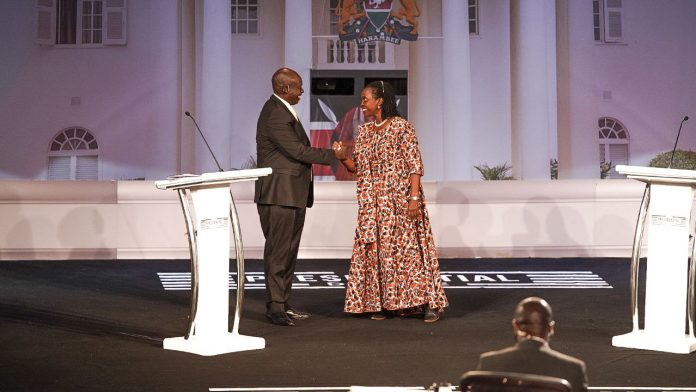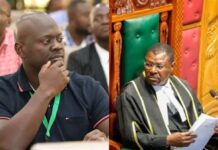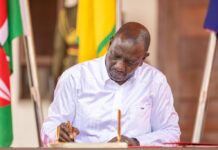The intrigues of the deputy presidential debate pitting Azimio la Umoja’s Martha Karua and UDA’’s Rigathi Gachagua, played out at the Catholic University of Eastern Africa (CUEA) on Tuesday, July 19 with the issues of integrity coming at the centre of the debate.
Ms Karua, a former Justice Minister, described herself as an honest and hardworking Kenyan who does not believe in the primitive accumulation of wealth.
Rigathi, whose Sh200 million assets were frozen by the court on suspicion of being graft proceeds, maintained that he, too, was clean.
The Narc Kenya boss asked how Mr Gachagua had made his wealth, a subject that the Mathira MP had, for a while, dodged.
She said that Azimio was ready to “confront the monster”, saying that she and Mr Odinga, “her Captain”, had supported the anti-corruption fight.
She accused UDA of giving the fight against corruption a wide berth.
Dr Ruto’s running mate would allege “state capture”, a concept that Karua agreed existed, but termed it as corruption propagated by cartels.
Mr Gachagua was, seemingly, on a mission to tie Azimio to the Jubilee administration and their failures, claiming that the President would micromanage an Azimio government, claims Karua refuted.
The Mathira MP blamed his woes on President Uhuru Kenyatta saying he was a victim of Uhuru’s wrath to whip everybody to support his “political project”.
“I don’t have billions, I only have Sh203 million in that account. I am worth Sh800 million minus the Sh200 million they are holding, that’s Sh600 million,” he said.
On the other hand, Karua stated that she was not hungry for earthly wealth and that she was worth Sh150 million.
“This is because the Sh56 million I had declared in 2013 has appreciated because of inflation,” Karua said.
“I am a person many may not understand. I am not thirsty for land, I am happy to say I have a house I call home and a house in my father’s land,” she said.
On his part, Gachagua said he is worth Sh800 million, including the Sh200 million frozen by the state over links to corruption claims.
“Sh64 million I worked with ministry of Lands and Settlement, Sh10 million, I worked with Kenya Power, Sh33 million I worked with the ministry of Livestock another Sh36 million I worked with another organization called Patek,” Gachagua said as he broke down his wealth.
The two, touted as abrasive politicians, were asked what kind of DP they would be in the government that takes over after the August 9 elections in light of the strained relations between President Uhuru Kenyatta and Ruto, characterised by frequent public spats.
“I will be a deputy president who is respectful of the Constitution, the people of Kenya and my principal,” Ms Karua said, stating that her role would be complimentary to help “my captain stick to the rule of law.”
Gachagua said that he had a “fairly good idea of how to help my candidate and give him backup.”
They agreed on the complementarity that the president and their deputy should espouse in delivering their promises, captured in their respective manifestos, which both candidates said were the results of consultative engagements with the public.
Ms Karua added that it was natural that the president and their deputy would have disagreements and said that such must be settled in private, and should not be aired in public as is the case with Dr Ruto and President Uhuru Kenyatta.
The Mathira MP dismissed the thought that disagreements could exist between himself and the DP if they were to be elected.
“I like to look at life from a positive point of view,” Mr Gachagua said. “It is incomprehensible that we could have sideshows.”
He blamed differences between the President and his deputy on an “inferiority complex” that does not allow strong-willed deputies to thrive.
Ms Karua retorted that the differences between the President and the Deputy had rendered the government incapable of combating corruption, and that the best course of action if one disagreed with their boss was to leave.
“Those who don’t understand principle cannot comprehend resigning. It is dishonest to earn a salary without serving,” she said.



















